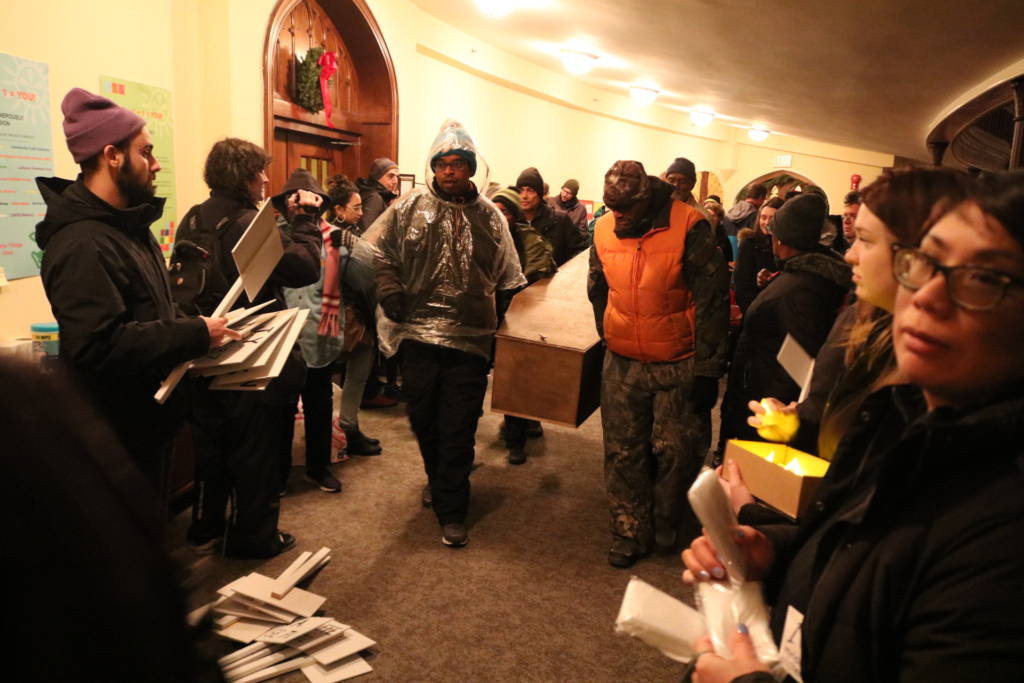As evening fell, more than 105 local activists and community members crowded together in the Luther Place Church on Dec. 20 to memorialize the lives of at least 54 people without homes and 83 individuals recently housed who passed away in the last year in the District of Columbia.
D.C. Mayor Muriel Bowser was invited to speak at the event but did not attend.
This event marked the beginning of the sixth annual overnight homeless memorial vigil hosted by The People for Fairness Coalition, a community organization dedicated to ending homelessness.
“We pray that those who have gone before us know that they are not alone, that we are … still honoring their presence, still remembering that they are never invisible in love,” said Karen Brau, Head Pastor at Luther Place Memorial Church.

The vigil and related advocacy have been organized as a local supplement to the National Homeless Persons Memorial Day service that has been held by the National Coalition for the Homeless since 1990. The NCH day of observance coincides with the Winter Solstice, the longest night of the year.
“We’re all walking in darkness, literally, [during the march], to find some kind of light,” said Rev. Laura Cunningham, Pastor, and Head of Staff at Western Presbyterian Church. “In one way or another, we’ve all seen it, the darkness of homelessness… may you see divine light in the human form among those who have gathered here, and may you have the courage to take the next step in advocating, speaking, and giving generously.”
The life expectancy of a homeless individual in D.C. is 57, compared to the general population’s 76. When medically vulnerable populations – such as elderly people or those with mental illness or chronic health concerns – land on the streets, their well-being often deteriorates. Dr. Catherine Crosland, Medical Director of Unity Healthcare, has spent the past nine years treating homeless patients. Crosland spoke to the crowd of the experience of Wanda, her former patient. She said that at 63 years old, Wanda had multiple medical conditions but was healthy overall. Her apartment burned down, forcing her and her son into a family shelter. According to Crosland, Wanda developed shortness of breath, gained 15 pounds and had swelling in her legs within a month of moving to the shelter.
It wasn’t long until Wanda passed away.
“Had Wanda been in an apartment, I believe she would have been alive today,” Crosland said as she wiped away tears. “Housing is healthcare.”
Another health concern brought up during the opening service was the impact of weather. Dr. Laura Zeilinger, Director of the D.C. Department of Human Services said that is especially important this year, the wettest year on record for Washington, D.C.
“The shelter hotline and outreach alone cannot find every person to make sure they are safe and dry,” said Laura Zeilinger, Director of the D.C. Department of Human Services, emphasizing the need for community members to look out for one another.
Zeilinger added that if a person comes across a homeless individual during inclement weather conditions, “ask if they’re okay, ask if there’s something they need, can call the Shelter Hotline. Try to engage with them, and get them to a safe place.
“We need to make sure people are seen, and that we’re using the help we have available.”
The 24-hour Shelter Hotline is 202-399-7093.
Speakers also said many vulnerable individuals require additional support when making the life-changing transition into stable housing.
“People are dying in wonderful new houses because there is not enough transitional support,” said Ken Martin, a member of member of the People for Fairness Coalition. Martin also spoke of his own struggles during his transition from homelessness to housing.

“Our jobs are not done with our neighbors once they move into housing,” Zeilinger said. “We need to find ways to stay connected with our neighbors, and form a community to help them with that transition into housing.”
PFFC recommended several possible political solutions to homelessness.
“Housing is the best form of health care anyone can have,” said Robert Warren, Director of PFFC. “ [D.C.’s plan to end homelessness] can be the solution, but only if it’s fully funded. We call on Mayor Bowser to end chronic homelessness in her second term and to start by investing $35.5 million in her upcoming budget to house 1,140 individuals and 177 families.”
PFFC further asked Bowser and the D.C. Council to end discrimination against people experiencing housing instability by reintroducing the Michael A. Stoops Anti-Discrimination Amendment Act during the next legislative session. Previously introduced in 2017, the statute would include homeless individuals under the protection of the D.C. Human Rights Act of 1977.
[Read more: This anti-discrimination bill could help people escape homelessness, if the D.C. Council would give it a hearing]
While Jesse Rabinowitz, Advocacy and Campaign Manager of the homelessness nonprofit Miriam’s Kitchen, commended the Bowser administration for increasing funding towards homelessness services and admonished the local government for making “small-scale changes” that cannot solve the housing crisis on their own.
“Four years ago, [Bowser] ran on a platform of ending homelessness,” Rabinowitz said. “That is far from realized. I would like the mayor to commit to ending chronic homelessness in the next four years.”
“More investments won’t bring [the deceased] back, but we can honor them by making investments to make sure nobody lives or dies without housing,” Rabinowitz said. “D.C. can afford to end chronic homelessness. As tonight illustrates, we are very literally running out of time.”









